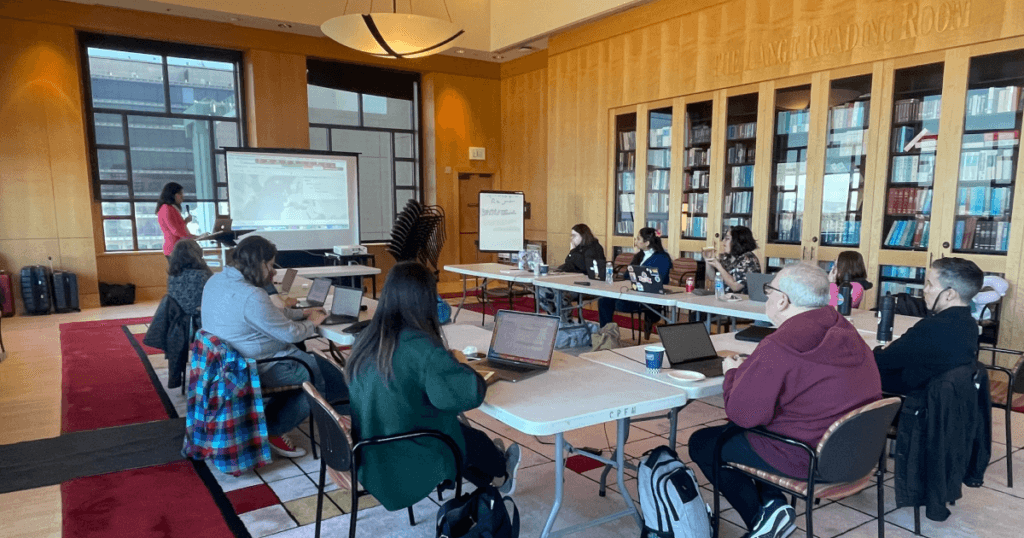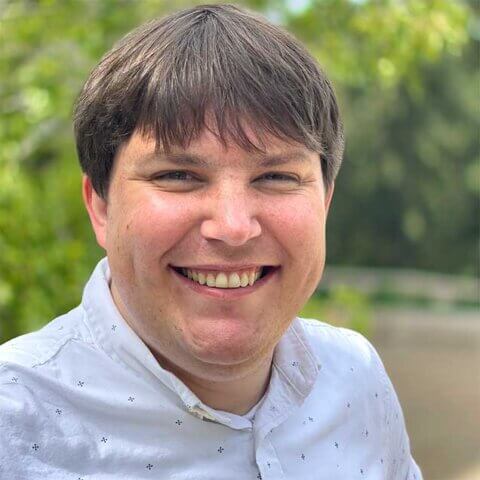In November, the Advancing Digital Health Humanities Institute (ADHHI) welcomed 11 members of the 2024 cohort to the UCSF Kalmanovitz Library for a practicum on the digital health humanities. A five-day series of workshops and lectures, the ADHHI practicum introduced various methods and theories central to the health humanities and the digital humanities. The chosen scholars represent a range of disciplines, career stages, and research interests. Their projects range from inquiries into the history of health to interventions regarding the treatment and representation of the sick in contemporary culture. During the practicum, the cohort fostered connections between their fields while learning about different digital methods and humanistic approaches to support their projects.
UCSF Library-led sessions
The practicum consisted of seminars on various topics, from text analysis to digital archiving to research ethics. Several teaching sessions were led by UCSF Library staff. Head of Data Engineering Geoff Boushey, MS, led the Python and text analysis sessions. Industry Documents Library Processing and Reference Archivist Rachel Taketa, MLIS, Industry Documents Library Project Archivist Emma James, MA, and Digital Archivist Lisa Nguyen, MLIS, MA, led an extended session on digital metadata and the archiving platform Collection Builder. Finally, Digital Health Humanities Program Coordinator Sean Purcell, MFA, led project management and tools sessions on tabular data, network graphs, and GIS mapping.
Additional presentations
The ADHHI also brought in a pair of consultants from outside the university to build and teach the program’s curriculum. Scholar-in-Residence at the Regeneración Lab at the University of California, Santa Barbara, Lyra D. Montiero, PhD, taught a session on research ethics. Postdoctoral fellow in the Department of History and Philosophy of Science and Medicine, Indiana University, Caterina Agostini, PhD, led sessions on textual analysis, R, and OpenRefine.
There were also presentations on the application of many of the tools and methods learned during the practicum
- “Art in the Time of Syphilis: Interpreting Sources and Crafting Identity” by Postdoctoral Fellow in Department of History and Philosophy of Science and Medicine, Indiana University, Caterina Agostini, PhD
- “The Sugar Industry Documents: Their History and the Importance of Historical Documents Research” by UCSF Associate Professor in the Department of Preventive and Restorative Dental Sciences, Division of Oral Epidemiology and Dental Public Health and the Philip R. Lee Institute for Health Policy Studies, Cristin Kearns, DDS, MBA
- “The UC ClioMetric History Project and Formatted Optical Character Recognition (FOCR)” by Assistant Professor of Economics at Princeton University, Zachary Bleemer, PhD
About the ADDHI
The ADDHI program supports scholars interested in the intersection of the health humanities and the digital humanities. Its programs facilitate the adoption of digital tools, like textual, geospatial, or network analysis, to their human health-related research projects. It also collects and connects an interdisciplinary cohort and community of scholars who will help define the future of the digital health humanities. This practicum is a starting point for the ADDHI scholars. They will share their completed projects at a symposium in November 2025.
Support from the NEH
The Advancing Digital Health Humanities Institute is a two-year program designed to introduce and orient researchers to humanistic and computational methods used in digital health humanities research. It is funded through the National Endowment for the Humanities Institutes for Advanced Topics in the Digital Humanities.

